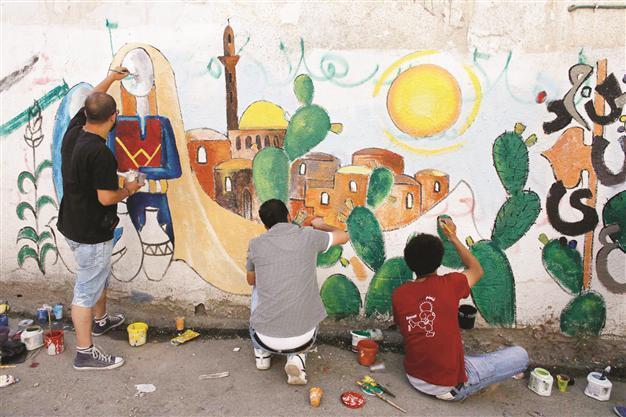Police take measures at al-Aqsa for Nakba
JERUSALEM - Agence France-Presse

Palestinians paint a mural depicting the al-Aqsa in Jerusalem’s Old City. Police have limited non-Muslim visits to the Al-Aqsa mosque to ‘prevent incidents. REUTERS photo
Jerusalem police closed the flashpoint Al-Aqsa mosque compound to non-Muslim visitors on May 16, in what they said was an effort to avoid a repetition of recent Palestinian unrest.
The decision followed disturbances on May 15 in Israeli-annexed east Jerusalem where police used stun grenades, water cannons and mounted officers against Palestinians who hurled rocks during protests marking the anniversary of Israel’s foundation in 1948. While Israel has been celebrating its foundation, Palestinians marked “Nakba Day,” (the Day of the Catastrophe) an annual day to commemorate the displacement that preceded and followed the Israeli Declaration of Independence.
“A decision was taken after the past 24 to 48 hours of incidents [...] and measures have been taken to prevent incidents on the Temple Mount,” police spokesman Micky Rosenfeld told Agence France-Presse, using the Jewish term for the compound in the walled Old City, which houses the Dome of the Rock and Al-Aqsa mosques.
Rosenfeld said that there had been no reported disturbance there yesterday and the limitation of visitors was a preemptive move which would be reviewed later in the day. “At the moment it’s quiet and we want it to continue to be quiet,” he said.
There were scuffles at the site last week as Israelis celebrated their capture of the Arab eastern sector of Jerusalem from Jordan in the 1967 Six Day War.
In 1948, more than 760,000 Palestinians – estimated today to number more than five million with their descendants – fled or were driven out of their homes.
Israel to ‘legalize’ settler outpostsIn a separate development, Israeli settlement watchdog Peace Now said yesterday that the government wanted to give retroactive approval to four West Bank settlement outposts it had previously pledged to at least partially demolish.
In a written response to a petition Peace Now submitted to Israel’s Supreme Court against the outposts, the state attorney’s office said that settlers had now purchased the private Palestinian land on which they built, paving the way for the government to give its blessing. “In the response, the government declares its intention to legalize four outposts, in isolated areas,” Peace Now said in a statement, adding that the strategy was an affront to U.S. Secretary of State John Kerry’s efforts to revive dormant Israeli-Palestinian peace talks.
“The intention to legalize outposts as new settlements is no less than a slap in the face of Kerry’s new peace process,” Peace Now said. “The government is indicating it is not committed to peace or to a two-state solution.” Givat Assaf, Givat HaRoeh, Maaleh Rehavam and Mitzpe Lachish outposts are among six listed in a 2005 government report as deserving immediate eviction and later ordered shut by a court order. Repeated government appeals have delayed the process. The Supreme Court is to hear the Peace Now petition on May 22.
The largely right-wing coalition government of Prime Minister Benjamin Netanyahu draws much of its political support from settlers. Israel considers settlement outposts built without government approval to be illegal. They usually consist of little more than a few trailer homes. But the international community considers all settlements built in the West Bank, including east Jerusalem, to be illegal.
The issue is one of the most contentious in the Israeli-Palestinian conflict and brought peace negotiations to a halt in September 2010, when an Israeli freeze on new West Bank settlement construction expired and Netanyahu declined to renew it. Palestinian president Mahmoud Abbas said that negotiations would not resume until Israel halts settlement building.
